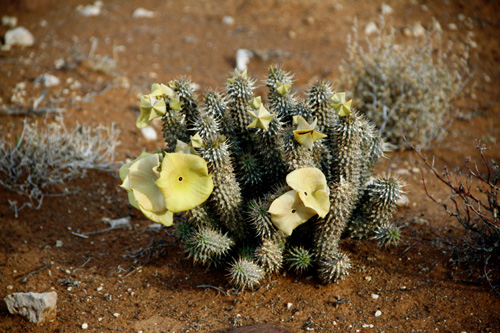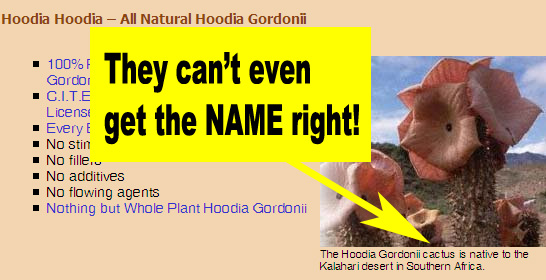Hoodia Hoodwinked?
In 2004 the CBS news program 60 Minutes did a segment on a little-known succulent plant called hoodia. Correspondent Lesley Stahl reported that, "It's very different from diet stimulants like Ephedra and Phenfen that are now banned because of dangerous side effects. Hoodia doesn't stimulate at all. Scientists say it fools the brain by making you think you're full, even if you've eaten just a morsel."
Then an aboriginal Bushman named Toppies Kruiper took the 60 Minutes news crew out in the desert to find the amazing plant. Once they located it, Kruiper cut off a stalk, gave it to Lesley Stahl and she ate it.
Stahl reported no ill effects, no funny aftertaste, no racing heart or upset stomach. She simply wasn't hungry all day.
A new diet scam was born.
With little more information than that, people began to clamor for hoodia to help them lose weight. Supplement companies responded, and within months hoodia capsules, powders and chewable tablets had become a multi-million dollar business. Today the name hoodia is even used to market liquid extracts and teas.
Here's the bad news. NONE of the "hoodia supplements" on the market as of September 2007 have been shown to work. Every single one of them are engaged in deceptive or illegal marketing. Here's why I'm confident enough to make that statement.
South Africa's national laboratory first investigated hoodia in their study of indigenous foods in the 1960s. They discovered that when hoodia was fed to animals, the animals lost weight. It took another 30 years for them to isolate, identify and patent the appetite-suppressing ingredient. They then licensed the worldwide rights of that patent to one company by the name of Phytopharm.
Phytopharm has since gone on to spend millions of dollars researching hoodia, including conducting clinical studies on humans. They claim that subjects who ate hoodia wound up eating around 1,000 calories a day LESS than people who didn't take the supplement. But those studies still aren't public and there are problems.
Phytopharm had been in a partnership with the pharmaceutical company Pfizer, which funded much of the research. In 2003 Pfizer dropped out of the project because they believed it wouldn't be commercially viable to make pills using the active ingredient in the hoodia plant. Since then, Phytopharm has been setting up hoodia "plantations" to grow enough for their eventual products.
Unfortunately, hoodia can take years before it reaches maturity and it only grows in extremely hot conditions. Before Phytopharm licensed it, Hoodia had never been cultivated and was found only in the wild.
With many of those challenges unresolved, Phytopharm has some questions and answers on their website.
One of the questions is, "When will the product containing the Hoodia extract be available?"
They answer with, "The necessary clinical trials and other studies to ensure the safety of the extract will take a few years before a product will be available."

There isn't enough hoodia in the world to fill all the
bottles that claim to have some in them.
If it was easy, Phytopharm would have released a product and started to recoup some of their investment. But it's not easy. In fact, it's so difficult, even the huge pharmaceutical company Pfizer chose to abandon the project. After spending millions of dollars, and with decades of work behind it, Phytopharm still believes a viable product may be years away.
With those kinds of obstacles, no company currently selling hoodia has had the time to test, secure the raw materials or synthesize the extract needed to put in their "hoodia supplements."
It gets even worse. There are no published studies of hoodia's risks or side effects. Nobody knows what interactions may occur if hoodia is taken with medicines or other supplements. There is no safety information available to the public AT ALL.
If you happen to have products that claim to contain Hoodia in them, throw them away. If you see hoodia in a store, don't buy it. Until a medically sound, double-blind study is conducted and published about the effects and/or side effects of Hoodia, you should avoid any products that claim to have any levels of Hoodia in them.
Call for a FREE Consultation (305) 296-3434
CAUTION: Check with your doctor before
beginning any diet or exercise program.
9/30/2007



